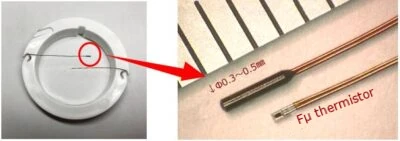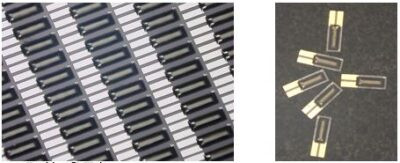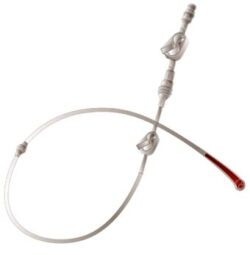Introduction
Our medical temperature sensors (Fμ thermistors) are the world’s only thermistor sensors that use SEMITEC’s proprietary thin-film thermistor technology. Compared to existing thermistors, this thermistor sensor is suitable for catheters with its mass production, mechanical strength, high reliability, accuracy, and high responsiveness.

External shape of Fμ thermistor

Features of Fμ thermistor
Feature 1: Mass production possible
The manufacturing process of Fμ thermistors uses semiconductor technology, which enables mass production under complete quality control. The thermistor part is coated with glass to provide excellent environmental resistance.

Feature 2: Accurate temperature measurement
Fμ thermistors offer the highest precision for catheter thermistors. Resistance precision is ±1% for standard products and ±1% for constant B.
(Resistance precision of ±0.5% is also possible.)
Feature 3: High responsiveness
The use of Fμ thermistors allows the sensor to be miniaturized and provides high responsiveness.
Adoption Case
Temperature sensor for catheters
A thermodilution catheter is an examination catheter inserted into the pulmonary artery of the heart to measure cardiac output.
The principle behind the measurement is to supply a fixed amount of low temperature saline solution to the heart via a catheter, and downstream, the temperature of the blood is monitored by a temperature sensor placed inside the catheter, and cardiac output is calculated from the time taken for the temperature to start changing and return to normal, requiring high responsiveness and precise temperature control in the temperature sensor.
The Fμ thermistor is a small thin-film thermistor with electrodes arranged in a different way, resulting in a thermistor with a lead wire that can be inserted into small diameter holes.
The resistance value of thin-film thermistors can be adjusted by laser trimming to improve mass production and temperature measurement performance, and they are used by medical device manufacturers as temperature sensors for thermodilution catheters.





